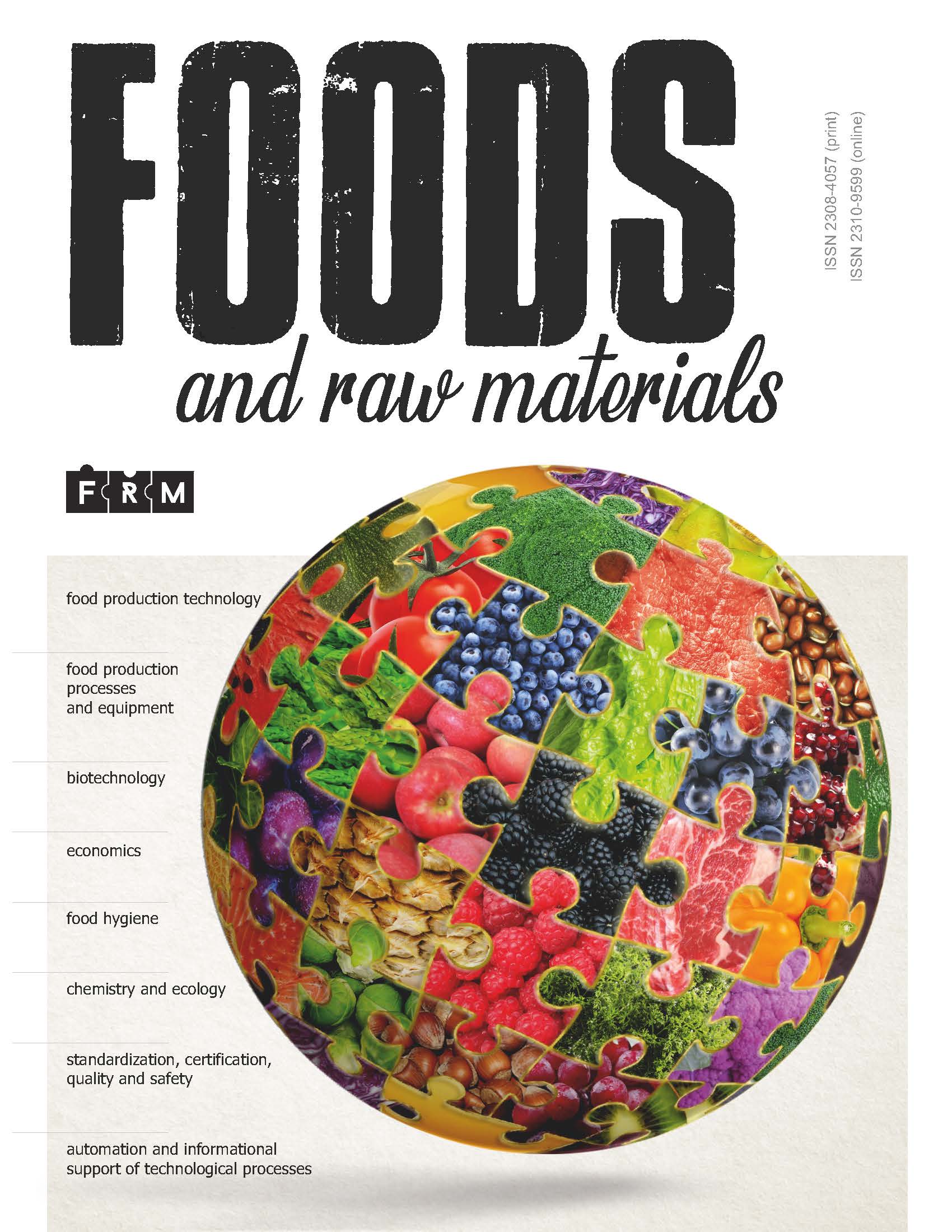Кемерово, Россия
Кемерово, Кемеровская область, Россия
The problem of preserving the viability, stability and activity of thermophilic lactic acid bacteria Lactobacillus bulgaricus upon freezing is considered. The effect of different freezing conditions and low-temperature storage on the biochemical and morphological properties and stability of the DNA of L. delbrueckii ssp. bulgaricus has been investigated. Sensory evaluation has been carried out for non-frozen bacterial starter cultures containing L. bulgaricus, and their basic physical and chemical parameters (titratable and active acidity and relative viscosity) have been determined. The influence of low temperature on these parameters has been investigated. The effect of freezing and low-temperature storage on the antagonistic activity of L. delbrueckii ssp. bulgaricus strains has been elucidated. The optimum freezing and storage temperatures for the starters containing L. bulgaricus have been determined.
freezing, low temperature storage, biochemical and morphological properties of L. bulgaricus, antagonistic activity
INTRODUCTION
The quality of cultured dairy foods depends directly on their production technology and on proper selection, preservation, and subsequent culturing of the starter microflora. The microorganism conservation methods known today consist in bringing the vegetative cells of the microorganisms into an anabiotic state. Since these cells are incapable of passing to the endogenous dormancy state, mmersing them into exogenous dormancy (by drying, lyophilization, freezing, etc.) and bringing them out of this state produce stressful situations that cause death of a considerable part of the microorganism population and lead to phenotypic and genotypic changes. Bacterial cells are known to induce nuclease in response to a cold shock, so the lethal effect of low temperatures is due to DNA destruction [1, 2].
Advantages of freezing technologies and low-temperature storage of bacterial starter cultures over the other conservation methods are that they are simple and convenient, require only a small amount of preparative work, and allow rapid recovery of the stored material from the frozen state. Compared to drying and lyophilization, freezing causes less damage to microorganism cultures and leaves them more viable [1, 3–5]. In addition, freezing rarely induces genetic changes [1, 3, 4, 6].
The purpose of this work was to study the effects of various freezing temperatures and conditions and low-temperature storage conditions on the biochemical properties, enzymatic activity, morphology, and genetic stability of thermophilic lactic acid microorganisms of the L. bulgaricus genus.
EXPERIMENTAL
Bacterial starters were obtained from lyophilized bacterial starter cultures produced by Barnaul’skaya Biofabrika Co. (L. Bulgaricus; BBV = Bulgarian bacillus, viscous; BBNV = Bulgarian bacillus, nonviscous) and from the L. bulgaricus strains В-3964, В-6516, В-3141, В-6543, and В-6515 from the Russian National Collection of Industrial Microorganisms (RNCIM) at the Institute of Genetics and Selection of Industrial Microorganisms.
The lactic acid bacteria culturing medium was reconstituted nonfat dry milk (RF State Standard GOST R 52090-2003), which had no off-flavors or foreign odors and did not contain inhibitors.
The milk was sterilized in an autoclave (steam sterilizer, DGM-500 model) for 10–15 min at a pressure of 0.1 MPa and a temperature of 121 ± 2°С.
The laboratory fermentation starter was prepared under sterile conditions in an abacterial air environment PCR box (Laminar-S). Lyophilized starter cultures were introduced into sterile milk cooled to 38–39°С, which was then thoroughly stirred. Fermentation was performed in a TSO-1/80 SPU thermostat at 40–41°С until the formation of a clot of desired quality.
The starter cultures were frozen at –45, –25, or –10°С in air and in a liquid coolant (ethanol). Freezing was carried out in special-purpose low-temperature chambers.
1. Rakhuba, D.V. and Novik, G.I., Kriokonservatsiya probioticheskikh mikroorgaizmov: nauchnye osnovy prakticheskogo ispol’zovaniya (Cryoconservation of probiotic microorganisms: scientific foundation of application), in Mikrobnye biotekhnologii: Fundamental’nye i prikladnye aspekty (Microbial Biotechnologies: Fundamental and Practical Aspects), Minsk: Loginov, 2007, issue 1, pp. 268-276.
2. Kholodnyi stress i biologicheskie sistemy (Cold Shock and Biological Systems), Tsutsaeva, A.A., Ed., Kiev: Naukova Dumka, 1991.
3. Sotchenko, O.G. and Safronenko, L.V., Pishchevaya promyshlennost’: nauka i tekhnologiya (Food industry: science and technology), 2009, no. 1 (3), pp. 14-18.
4. Sotchenko, O.G. and Danik, S.V., Vestsi natsyyanal’nai akademii navuk Belarusi, seryya agrarnykh navuk (Bulletin of the national academy of science of Belarus, agricultural science series), 2005, no. 5, pp. 193-194.
5. Johnson, J.A.C. and Etzel, M.R., Journal of Dairy Science, 1995, vol. 78, no. 4, pp. 761-768.
6. Khamagaeva, I.S., Kachanina, L.M., and Tumurova, S.M., Biotekhnologiya zakvasok propionovokislykh bakterii (Propionic Acid Bacteria Starter Cultures: Production Biotechnology), Ulan-Ude: Vostochno-Sibirskii Gos. Tekhnol. Univ., 2006.
7. Bespomestnykh, K.V., Babich, O.O., Prosekov, A.Yu., and Korotkaya, E.V., Tekhnika i teknologiya pishchevykh proizvodstv (Engineering and technology in the food industry), 2010, no 1, pp. 64-68.
8. Netrusov, A.I., Egorova, M.A., and Zakharchuk, L.M., Praktikum po mikrobiologii (Labs in Microbiology), Moscow: Akademiya, 2005.
9. Foschino, R., Fiori, E., and Galli, A., Journal of Dairy Research, vol. 63, no. 2, pp. 295-303.
10. Fonseca, F., Marin, M., and Morris, G.J., Applied and Environmental Microbiology, 2006, vol. 72, no. 10, pp. 6474-6482.
11. Fonseca, F., Béal, C., and Corrieu, G., Cryobiology, 2001, vol. 43, no. 3, pp. 189-98.
12. Kriobiologiya i biotekhnologiya (Cryobiology and Biotechnology), Tsutsaeva, A.A., Ed., Kiev: Naukova Dumka, 1987











